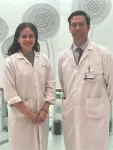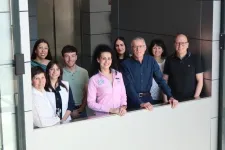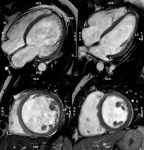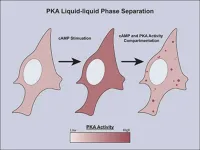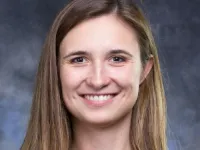(Press-News.org) April 22, 2024
European Union Should Adopt a Research-Based Approach to Ensure the Quality and Safety of Substances of Human Origin
London/Toronto – Substances of human origin (SoHOs) such as blood, plasma, skin, corneas, and embryos play an increasing role in life-saving medical procedures. Governments around the world are reevaluating their healthcare policies to ensure of a supply of SoHOs for their population, while also considering the best-interests of both donors and patients.
A paper published today in British Medical Journal - Global Health examines the issues surrounding the regulation of SoHOs for governments as the Council of the European Union (EU) and the European Parliament recently agreed in December 2023 on a new “Regulation on standards of quality and safety for substances of human origin intended for human application.”
The paper, coauthored by Professor Nicola Lacetera of the University of Toronto, urges that it is imperative for the EU to adopt a balanced, empirically sound, and research-backed approach which promotes policies to safeguard the interests of donors and patients, while ensuring a safe supply of SoHOs.
"Recent studies and reviews of the evidence over the last 40 years have concluded that the statistically sound, field-based evidence from large, representative samples shows that properly devised rewards increase supply without compromising the quality and safety of blood and blood components,” says Prof. Lacetera. “ At least where plasma for fractionation is concerned, the unpaid-donor system has failed to meet demand. In Europe, countries allowing monetary compensation for donors are the only ones achieving self-sufficiency in plasma collection for the production of immunoglobulin.”
The paper conclude that the final objective of any new regulation should not merely be self-sufficiency in providing SoHOs for treatment but ensuring the availability of safe, sufficient, and accessible SoHOs for all in need. One of the more controversial aspects in the discussion has been the compensation of donors with the new EU regulation stating that the “donation of SoHO should be voluntary and unpaid.” Current scientific evidence shows that compensation increases supply without affecting the quality of the products. Without stronger individual incentives for donors and other strategies to reduce barriers to donate such as building additional collective centres, it is unlikely that the EU can achieve self-sufficiency.
The paper has implications for other jurisdictions who are currently reviewing their policies on the donation and use of substances of human origin, including Canada, where the debate as to whether allow compensation to plasma donors is longstanding.
Lacetera is a professor of strategic management at the University of Toronto Mississauga with a cross appointment to the Rotman School of Management. His co-authors of the paper are Prof. Julio Elias of Universidad del CEMA, Prof. Mario Macis of Johns Hopkins University, Prof. Axel Ockenfeis of the University of Cologne and Max Plank Institute for Research on Collective Goods and Prof. Alvin Roth of Stanford University.
The paper is online.
Bringing together high-impact faculty research and thought leadership on one searchable platform, the Rotman Insights Hub offers articles, podcasts, opinions, books and videos representing the latest in management thinking and providing insights into the key issues facing business and society. Visit www.rotman.utoronto.ca/insightshub.
The Rotman School of Management is part of the University of Toronto, a global centre of research and teaching excellence at the heart of Canada’s commercial capital. Rotman is a catalyst for transformative learning, insights and public engagement, bringing together diverse views and initiatives around a defining purpose: to create value for business and society. For more information, visit www.rotman.utoronto.ca
-30-
For more information:
Ken McGuffin
Manager, Media Relations
Rotman School of Management
University of Toronto
E-mail:mcguffin@rotman.utoronto.ca
END
European union should adopt a research-based approach to ensure the quality and safety of substances of human origin
2024-04-22
ELSE PRESS RELEASES FROM THIS DATE:
Study identifies signs of repeated blast-related brain injury in active-duty United States Special Operations Forces
2024-04-22
Repeated exposure to explosive blasts has the potential to cause brain injuries, but there is currently no diagnostic test for these injuries
In a study of 30 active-duty United States SOF personnel, researchers found that increased blast exposure was associated with structural, functional, and neuroimmune changes to the brain and a decline in health-related quality of life
The researchers are now designing a larger study to develop a diagnostic test for repeated blast brain injury
United States (US) Special Operations Forces (SOF) personnel are frequently exposed to explosive blasts during training and combat. However, ...
Mount Sinai scientists discover the cellular functions of a family of proteins integral to inflammatory diseases
2024-04-22
New York, NY (April 22, 2024) – In a scientific breakthrough, Mount Sinai researchers have revealed the biological mechanisms by which a family of proteins known as histone deacetylases (HDACs) activate immune system cells linked to inflammatory bowel disease (IBD) and other inflammatory diseases.
This discovery, reported in Proceedings of the National Academy of Sciences (PNAS), could potentially lead to the development of selective HDAC inhibitors designed to treat types of IBD such as ulcerative colitis and Crohn’s disease.
“Our understanding of the specific function of class II HDACs in different cell types has been limited, impeding ...
Spanish scientists identify the key cell type for strategies to prevent atherosclerosis in progeria syndrome
2024-04-22
Hutchinson-Gilford progeria syndrome (HGPS) is an extremely rare genetic disease that affects just 1 in every 20 million people; it is estimated that fewer than 400 children in the world have the disease. HGPS is characterized by accelerated aging, severe atherosclerosis, and premature death at an average age of about 15 years. Although people with HGPS do not normally have conventional cardiovascular risk factors (hypercholesterolemia, obesity, smoking, etc.), most patients die from the complications of atherosclerosis: myocardial ...
A new Spanish study provides the first stratification of the risk of developing dilated cardiomyopathy among symptom-free genetic carriers
2024-04-22
Dilated cardiomyopathy is the most frequent cause of heart failure in young people and is the leading cause of heart transplantation. In this disease, the heart enlarges and reduces its capacity to pump blood. People with dilated cardiomyopathy are at high risk for arrhythmias and sudden death.
In approximately 30%–40% of people with dilated cardiomyopathy, the disease is caused by a genetic mutation. When a genetic cause is identified, the patient’s family members can be studied to determine if they have also inherited the altered gene.
Family members who are carriers of the genetic mutation are at risk for developing the disease in ...
International Lawyer from the University of Warwick calls for fairness in WHO Pandemic Treaty Talks
2024-04-22
As the World Health Organization (WHO) pushes for countries to seal the Pandemic Treaty by May this year, researchers at the University of Warwick and Kings College London stress the need for fair negotiations.
The opinion piece, featured in PLOS Global Public Health journal, is led by Professor Sharifah Sekalala . The team highlights the importance of considering "Time Equity" in these talks, urging caution on setting deadlines and sharing the burden when time is tight.
Since COVID-19 hit, demands for health equity ...
International Society for Autism Research (INSAR) 23rd Annual Meeting to be held in Melbourne, Australia May 15-18, 2024
2024-04-22
The International Society for Autism Research (INSAR) will hold its 2024 Annual Meeting – the organization’s 23rd – from Wednesday, May 15 through Saturday, May 18, 2024, bringing together a global, multidisciplinary group of more than 1,200 autism researchers, clinicians, advocates, self-advocates, and students from 20 countries to exchange the latest scientific learnings and discoveries that are advancing the expanding understanding of autism and its complexities. This year’s ...
Liquid droplets shape how cells respond to change
2024-04-22
Healthy cells respond appropriately to changes in their environment. They do this by sensing what’s happening outside and relaying a command to the precise biomolecule in the precise domain that can carry out the necessary response. When the message gets to the right domain at the right time, your body stays healthy. When it ends up at the wrong place at the wrong time, you can get diseases such as diabetes or cancer.
The routes that messages take inside a cell are called signaling pathways. Cells use only a few signaling pathways to respond simultaneously to hundreds of external signals, so those pathways need to be tightly ...
COS Mason researchers translating research into practice to create climate-ready communities across Virginia
2024-04-22
COS Mason Researchers Translating Research Into Practice To Create Climate-Ready Communities Across Virginia
Four Mason researchers received funding for: “ART: Translating Research into Practice to Create Climate-Ready Communities Across Virginia.”
Leah Nichols, Executive Director, Institute for a Sustainable Earth, Research and Innovation Initiatives; James Kinter, Professor, Climate Dynamics, Atmospheric, Oceanic and Earth Sciences (AOES); Director, Center for Ocean-Land-Atmosphere Studies (COLA); Luis Ortiz, Assistant Professor, AOES; and Celso Ferreira, Associate Professor, Sid and Reva Dewberry Department of Civil, Environmental, and Infrastructure Engineering, are ...
Hao receives funding for NOAA AMSU-A CDR Products Support
2024-04-22
Hao Receives Funding for NOAA AMSU-A CDR Products Support ...
Life goals and their changes drive success
2024-04-22
“Where is my life going?” “Who do I want to be?”
As future-thinkers, adolescents spend significant time contemplating these types of questions about their life goals. A new study from the University of Houston shows that as people grow from teenagers to young adults, they tend to change the importance they place on certain life goals, but one thing is certain: The existence of high prestige and education goals, as well as their positive development, can drive success.
“Adolescents who endorsed higher levels of prestige and education goals tended to have higher educational attainment, income, ...

